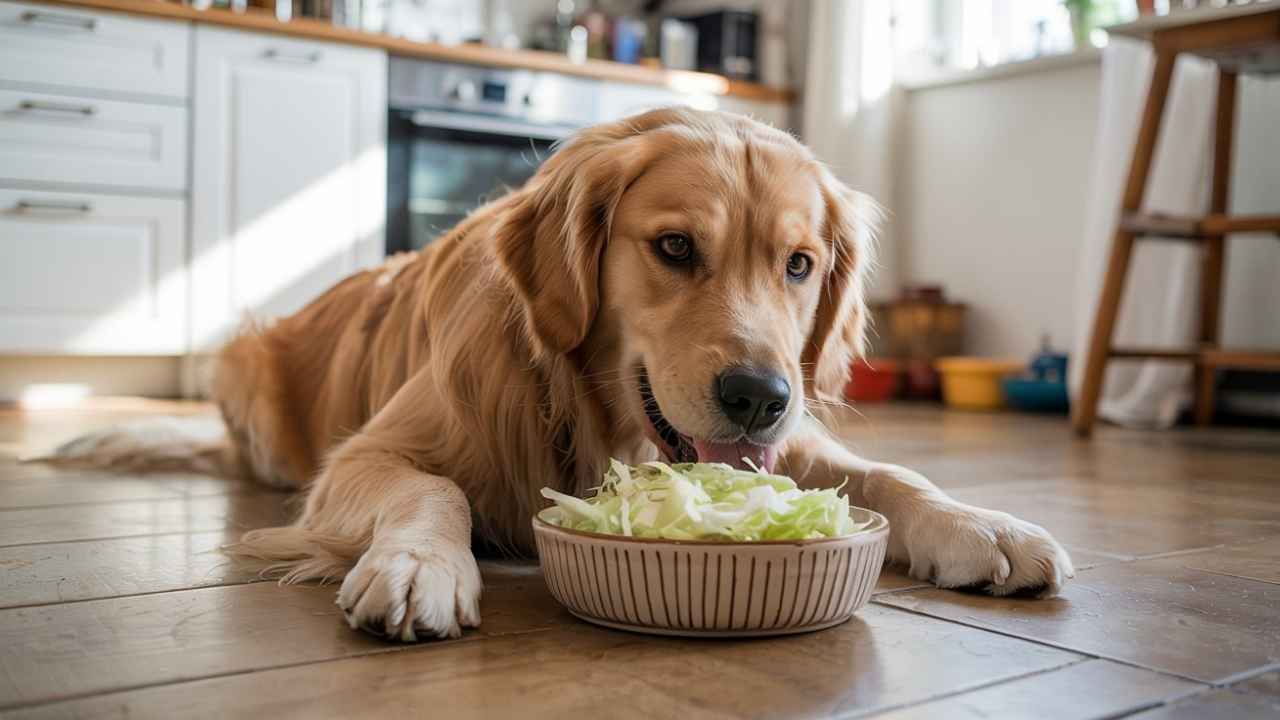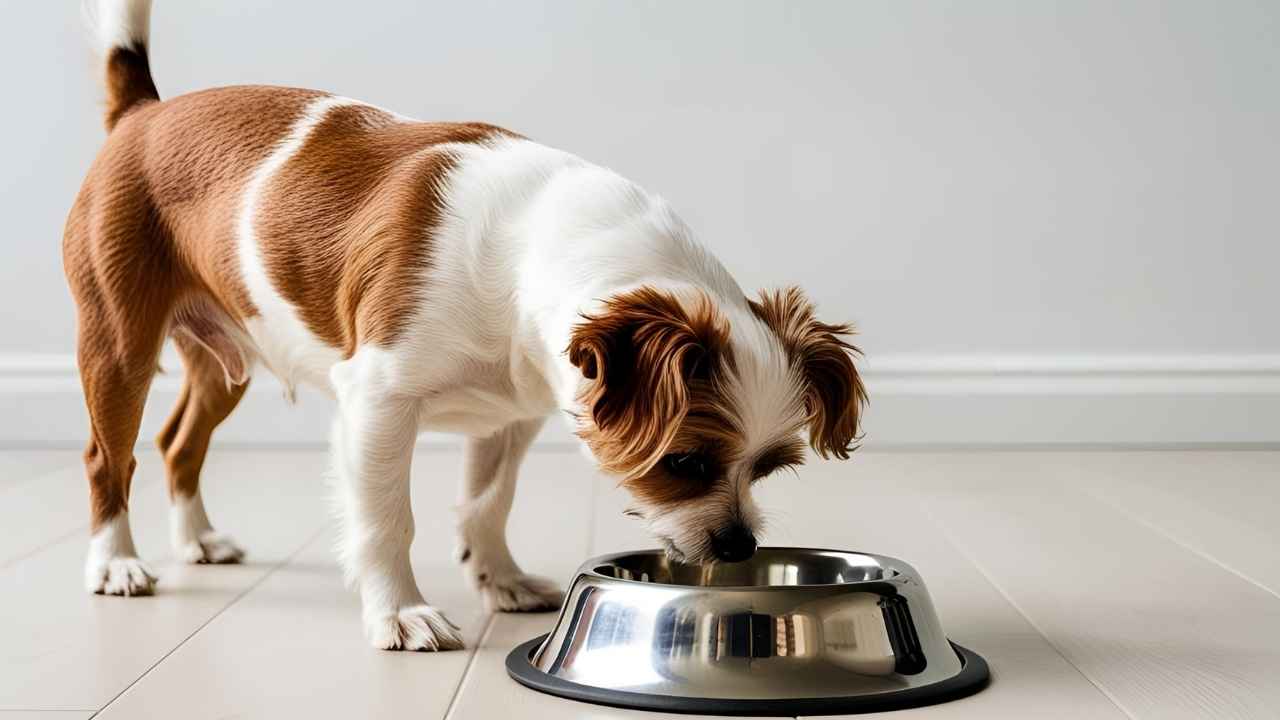Ever wondered if your dog can enjoy that tangy sauerkraut you’re adding to your hotdog? Many dog owners ask the same question — can dogs eat sauerkraut?
Sauerkraut is just fermented cabbage. It’s crunchy, sour, and full of healthy bacteria for humans. But when it comes to dogs, things are a little different. Some pet owners think about sharing sauerkraut with their dogs because it’s packed with probiotics and vitamins.
In this blog, we’ll give you clear answers. We’ll talk about whether sauerkraut is safe for dogs, its benefits, possible risks, and the best way to feed it to your dog. Let’s find out if sauerkraut should be on your dog’s menu or not.
What is Sauerkraut?
Sauerkraut is simply finely shredded cabbage that has been fermented. It’s made by mixing cabbage with salt and allowing it to ferment over time. During this process, lactic acid bacteria grow and break down the cabbage sugars, creating that tangy flavor.
Because of this fermentation process, sauerkraut is rich in:
- Probiotics for dogs: These are friendly bacteria that can help improve gut health in dogs.
- Fiber-rich food for dogs: Good for digestion.
- Vitamins and minerals: Including Vitamin C for dogs, Vitamin A for dogs, Vitamin K2 for dogs, iron for dogs, magnesium for dogs, and potassium for dogs.
Many people eat sauerkraut for its health perks — and some pet owners wonder if these same benefits apply to dogs.
Can Dogs Eat Sauerkraut?
The short answer: Yes, dogs can eat sauerkraut — but there’s a catch.
It’s only safe when given in small amounts and if it’s plain, unsalted, and unseasoned.
When Sauerkraut is Safe for Dogs
Dogs can enjoy sauerkraut if it’s:
- Homemade sauerkraut for dogs (with only cabbage and a little salt, properly fermented)
- Unpasteurized sauerkraut with no additives
- Free from garlic, onions, caraway seeds, fennel seeds, or sugar — these are toxic ingredients in sauerkraut for dogs
When sauerkraut is plain and clean, it can even support:
- Dog digestive health
- Gut health in dogs
- Canine immune system
- Healthy skin and coat
- Gastrointestinal health in dogs
When to Avoid Sauerkraut for Dogs
Most store-bought sauerkraut isn’t dog-friendly. It often contains:
- Added salt (high sodium content)
- Preservatives
- Spices like garlic and onions (dangerous for dogs)
- Sugar or vinegar
These ingredients can cause problems like:
- Dog kidney disorder
- Heart problems in dogs
- Digestive upset in dogs
- Dog blood pressure issues
- Dehydration in dogs
Nutritional Benefits of Sauerkraut for Dogs
Sauerkraut may seem like an unusual treat for dogs, but it actually has some nutritional benefits when fed in small amounts. Let’s break down why sauerkraut can be good for your dog’s health.
Rich in Probiotics
One of the biggest health benefits of sauerkraut for dogs is that it’s rich in probiotics. Probiotics are good bacteria that help improve gut health in dogs. When dogs eat sauerkraut, they consume lactic acid bacteria, which supports their digestive system.
These probiotics can help balance the dog’s gut microbiome, making digestion smoother. Many dogs face digestion problems like bloating, gas, or even chronic diarrhea. Adding a small amount of sauerkraut to your dog’s diet may improve digestion and help with stool consistency. This can be especially helpful for dogs with sensitive stomachs or those suffering from irritable bowel syndrome in dogs.
A healthy gut can also improve your dog’s immune system. Good bacteria in sauerkraut can fight off bad bacteria in dogs, reducing the chances of digestive tract inflammation in dogs or canine gastroenteritis.
High in Fiber
Sauerkraut is a fiber-rich food for dogs. Fiber plays an important role in a dog’s digestion. It helps keep things moving smoothly in the digestive tract and prevents constipation in dogs.
If your dog struggles with hard stools or doesn’t poop regularly, a small serving of sauerkraut can help. Fiber adds bulk to the stool and makes it easier to pass. It can also help dogs who suffer from bloating, flatulence, or mild digestive upset.
However, too much fiber can cause gas in dogs or an upset stomach, so moderation is key when feeding sauerkraut to dogs.
Packed with Vitamins & Minerals
Another reason why sauerkraut is good for dogs is its rich supply of vitamins and minerals. Sauerkraut nutrition for dogs includes essential nutrients like:
Calcium for dogs – Essential for strong bones in puppies and bone integrity in dogs.
Vitamin C for dogs – Supports immune system, helps with white blood cell production, and aids in cellular regeneration.
Vitamin K for dogs – Helps with blood clotting and bone health in dogs.
Vitamin B6 – Supports brain function and muscle development in dogs.
Iron for dogs – Boosts dog metabolism, helps with dog blood circulation, and can prevent dog anemia.
Risks & Potential Side Effects of Feeding Sauerkraut to Dogs
While sauerkraut can be healthy in small amounts, there are also risks you should know about. Feeding sauerkraut to dogs without understanding these risks can lead to health problems.
High Sodium Content
One of the biggest concerns is the sodium content in sauerkraut. Sauerkraut is high in salt because of the fermentation process. Too much salt is harmful to dogs and can lead to serious health issues like:
- Vomiting in dogs
- Diarrhea in dogs
- Dehydration in dogs
- Salt poisoning
- Increased risk of dog kidney disorder or dog cardiovascular disorder
High sodium intake can also cause heart problems in dogs and raise their blood pressure. If your dog already has heart issues or kidney issues, avoid giving them sauerkraut.
Added Spices & Toxic Ingredients
Store-bought sauerkraut often contains added spices and ingredients that are toxic to dogs. Ingredients like garlic and onion are very harmful. Garlic and dogs don’t mix – garlic can damage red blood cells and cause anemia in dogs. Onion toxicity in dogs can lead to vomiting, diarrhea, and serious health issues.
Some sauerkraut also contains caraway seeds, fennel seeds, or sugar, which are unsafe for dogs. Always check the ingredients before feeding sauerkraut to your dog. Only plain, pure cabbage sauerkraut without additives is safe.
Digestive Upset
While sauerkraut has probiotics that support digestion, some dogs may not tolerate it well. Sensitive dogs might experience:
- Gas in dogs from fermented foods
- Bloating in dogs
- Upset stomach in dogs
- Chronic diarrhea in dogs
If your dog is trying sauerkraut for the first time, start with a small amount and watch for signs of digestive upset.
Allergic Reactions & Food Sensitivity
Like any new food, sauerkraut can cause food allergies in dogs. Some dogs may have an allergy or sensitivity to fermented cabbage or the lactic acid bacteria in sauerkraut. Watch for symptoms like:
- Itchy skin or skin irritations in dogs
- Redness or rashes
- Vomiting or diarrhea
- Nervousness in dogs or behavior changes
If you notice any of these signs after feeding sauerkraut to your dog, stop immediately and consult your veterinarian.
How to Feed Sauerkraut to Dogs Safely
Feeding sauerkraut to dogs can be beneficial if done the right way. But it’s important to be careful, as dogs have sensitive stomachs. Here’s how to safely add sauerkraut to your dog’s diet without causing tummy troubles.
Choose the Right Sauerkraut
When picking sauerkraut for dogs, the best choice is homemade sauerkraut or pure cabbage sauerkraut without any extra spices, vinegar, or sugar. Many store-bought sauerkraut options contain preservatives, garlic, onion, and high sodium content, which are harmful to dogs.
Always avoid:
- Flavored sauerkraut with added ingredients.
- Canned sauerkraut loaded with vinegar.
- Sauerkraut with caraway seeds, fennel seeds, or added sugars.
Homemade sauerkraut is the safest because you control what goes in. If you buy it from a store, choose an unpasteurized sauerkraut with no harmful additives and low sodium. This way, your dog can safely enjoy the fermented cabbage and its probiotics.
Start with Small Portions
When feeding sauerkraut to dogs, always start slow. Too much sauerkraut can upset their stomach. Here’s a simple guide:
- Small dogs (under 20 lbs): ½ teaspoon to 1 teaspoon.
- Medium dogs (20-50 lbs): 1 to 2 teaspoons.
- Large dogs (50+ lbs): 1 to 2 tablespoons.
Watch your dog closely after the first few servings. Some dogs may have gas, bloating, or diarrhea due to the lactic acid bacteria and fermented foods. If you notice any adverse reaction like vomiting, loose stool, or excessive gas, stop feeding sauerkraut right away.
Mix It with Their Regular Food
The easiest way to give sauerkraut to dogs is by mixing a small amount into their regular dog food. This helps them get used to the tangy flavor and keeps their digestive tract happy.
You can:
- Add it as a dog food topper.
- Mix it with some plain boiled chicken.
- Blend it with a bit of plain yogurt if your dog is not lactose intolerant.
Always rinse the sauerkraut first to reduce the sodium content and soften the taste. Never serve sauerkraut as a full meal — it should be a small occasional treat, not a main part of their dog diet.
Frequency of Feeding
How often can dogs eat sauerkraut? Moderation is key.
A good rule is:
- 1-2 tablespoons once or twice a week (for large dogs).
- Smaller amounts for small and medium dogs.
Avoid feeding sauerkraut daily. Too much can lead to high sodium intake, which may harm heart health in dogs and cause kidney problems. Occasional feeding ensures your dog benefits from the nutritional value of sauerkraut without risks.
When Should You Avoid Giving Sauerkraut to Your Dog?
Sauerkraut may be packed with probiotics and fiber, but it’s not suitable for every dog. Here’s when you should avoid feeding sauerkraut:
- Dogs with kidney issues or salt sensitivity:
Sauerkraut is high in sodium content. Dogs with kidney disorders or heart problems can’t handle extra salt. It may worsen their condition. - Dogs prone to bloat:
Sauerkraut is a fermented food and may produce gas in some dogs. Dogs prone to bloating in dogs or large breed dogs with a deep chest should avoid it. - Dogs with food allergies or sensitive stomachs:
If your dog has a history of food allergies, irritable bowel syndrome in dogs, or frequent gastrointestinal health problems, skip the sauerkraut. It may trigger digestive tract inflammation in dogs. - Puppies and senior dogs:
Young puppies and senior dogs often have weaker immune systems and sensitive digestion. The strong flavor and fermentation may upset their stomach, leading to diarrhea in dogs or vomiting. Always consult your veterinarian before offering sauerkraut to puppies or elderly dogs.
If your dog has any existing health issues like dog cardiovascular disorder, dog kidney disorder, or digestive upset in dogs, it’s better to choose safer options.
Healthy Alternatives to Sauerkraut
If you’re not sure about feeding sauerkraut to your dog, there are other dog-friendly options that offer similar health benefits without the risks:
Plain Boiled Cabbage
Cabbage for dogs is a simple and safe choice. Boil a small amount of plain cabbage without salt or seasoning. It contains fiber and supports dog digestion without the strong tangy taste or fermentation side effects.
Pumpkin Puree
Pumpkin puree is excellent for digestive health in dogs. It’s rich in fiber and can help with constipation in dogs and mild diarrhea in dogs. Always use plain, unsweetened pumpkin without added sugar or spices.
Dog-Specific Probiotic Supplements
If you want to improve your dog’s gut health, you can buy dog gut health supplements specially made for dogs. These supplements contain the right amount of probiotics for dogs without the risks of fermented foods for dogs.
Fresh Veggies like Carrots or Cucumbers
Crunchy veggies like carrots and cucumbers are a great low-calorie treat. They’re good for your dog’s teeth, digestion, and metabolism. Plus, they’re safe and easy to digest.
FAQ
Can dogs eat cooked sauerkraut?
Yes, dogs can eat cooked sauerkraut, but it’s better to feed them plain, unseasoned, and unsalted sauerkraut. When you cook sauerkraut, it may lose some of the beneficial probiotics that support gut health in dogs. So, if you’re thinking about feeding sauerkraut to dogs, raw and plain is usually the better choice. Avoid added spices, garlic, onion, or caraway seeds as these can be harmful to dogs.
Is fermented food safe for dogs?
Fermented foods for dogs, like sauerkraut, can be safe in small amounts. The fermentation process creates lactic acid bacteria, which helps improve gastrointestinal health in dogs. Fermented cabbage is rich in probiotics for dogs and can help maintain canine gut health. However, too much fermented food can cause gas, bloating in dogs, or digestive upset. Always start with small portions and watch your dog’s reaction.
Can sauerkraut help my dog’s upset stomach?
Sauerkraut may help soothe an upset stomach in dogs because it’s packed with probiotics and fiber. These nutrients can support digestion and improve the balance of good bacteria for dogs. If your dog suffers from constipation, chronic diarrhea, or other dog digestion problems, small portions of sauerkraut might help. Still, it’s important to rinse the sauerkraut to lower its sodium content and avoid any harmful additives before feeding it to your dog.
What happens if my dog accidentally eats too much sauerkraut?
If your dog eats too much sauerkraut, they may experience digestive upset, including diarrhea in dogs, vomiting in dogs, bloating in dogs, or gas in dogs from fermented foods. High sodium content in sauerkraut can also raise the risk of dehydration in dogs or cause issues in dogs with heart problems or kidney disorders. Watch for signs like an upset stomach in dogs or increased thirst. Contact your veterinarian if you notice unusual behavior or symptoms.
Can I give my dog sauerkraut juice?
It’s not a good idea to give your dog sauerkraut juice. The juice contains a high sodium content, which can be harmful to dogs. Too much salt intake for dogs can lead to heart issues, kidney issues, or even high blood pressure. While the juice may have some probiotics, the risks outweigh the benefits. Always choose plain, rinsed sauerkraut without added juices or flavors when feeding sauerkraut to dogs.
You may also read: Can I Use Neosporin on Dog




